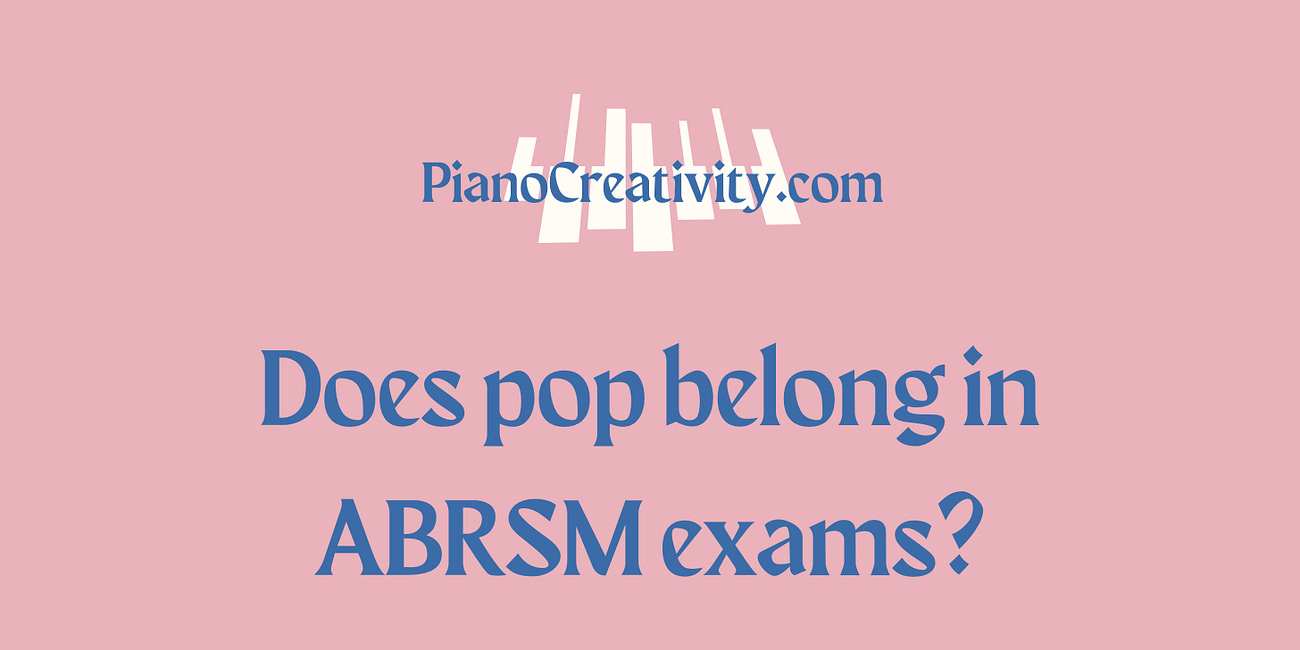Does pop belong on exam syllabuses? ABRSM responds!
Reassuring news from the biggest exam board
Earlier in the year, inspired by Andrew Eales’ review of the new ABRSM syllabus, I wrote this post:
The answer is yes, but…
I do think pop belongs in ABRSM exams, just as much as any other genre, but I think exam boards should:
ensure that their examiners are familiar with the original recordings of all the pop pieces in their syllabuses
encourage students to listen to the original recordings (plaudits to ABRSM for doing this in the Teaching Notes on the 2025 syllabus)
and, crucially, allow for sensible deviations from the written score that make the arrangement more accurately convey the original artists’ intentions.
A provocation
Earlier in the post I had quoted Andrew Eales’ review, in which he had drawn attention to ABRSM syllabus arrangements where the rhythm of the original has been changed significantly, and asked the question:
if an exam candidate plays these songs with the rhythm of the original recordings, rather than the sometimes adapted, quantised versions on offer, will they receive more marks, or in fact fewer?
I reword this, choosing a deliberately provocative word:
if an exam candidate corrects an arrangement that is wrong, will they be rewarded or penalised?
It caught the eye of Tim Topham, a passionate advocate for contemporary creativity in piano lessons, and when Tim was interviewing ABRSM’s Samantha Carrasco in his latest podcast, he posed the question!
Tim asks the question around 19:30, but you might want to scroll back a little for context.
By her own admission Samantha gives a somewhat circuitous answer but the core message makes me feel more optimistic about the future of ABRSM examinations. She quotes the ABRSM assessment criteria and notes that:
in relation to time, the elements that the examiner might be listening for at a distinction level would be ‘fluent with flexibility where appropriate’, which incorporates everything to do with an arrangement.
And in terms of shape, it says, ‘expressive idiomatic musical shaping and detail’.
And with performance, it says, ‘vivid communication of character and style’.
So, essentially, there is scope to put your own stamp on it in terms of either having slightly, you know, a slight variation in rhythmic freedom, rhythmic flexibility, like we would establish in all different types of music”
That’s really good news…
Essentially her argument seems to be:
all music in the exam—including pop—should be performed idiomatically
examiners will be aware of the idiom and will mark accordingly
In other words, if your student wants to alter the rhythm of a pop arrangement to make it closer to the original, they should be rewarded, not penalised.
…with a caveat
Even so, no examiner is perfect, and it’s not impossible that a student might still be penalised incorrectly. I’ve certainly witnessed questionable marking justifications from every one of the exam boards I’ve worked with. But in the event that happens, we should always challenge it, and use the marking criteria as our justification.
Thanks
Thanks very much to Tim for raising the topic on the interview, I appreciate it!
Any questions?
If you have any questions about teaching creativity, please send them to me!
I’m currently working on another post like the one linked below, and would love to help you out.






This sounds good in practice, but as an old cynic, I fear there are plenty of examiners out there who would mark such performances down for being ‘wrong’.